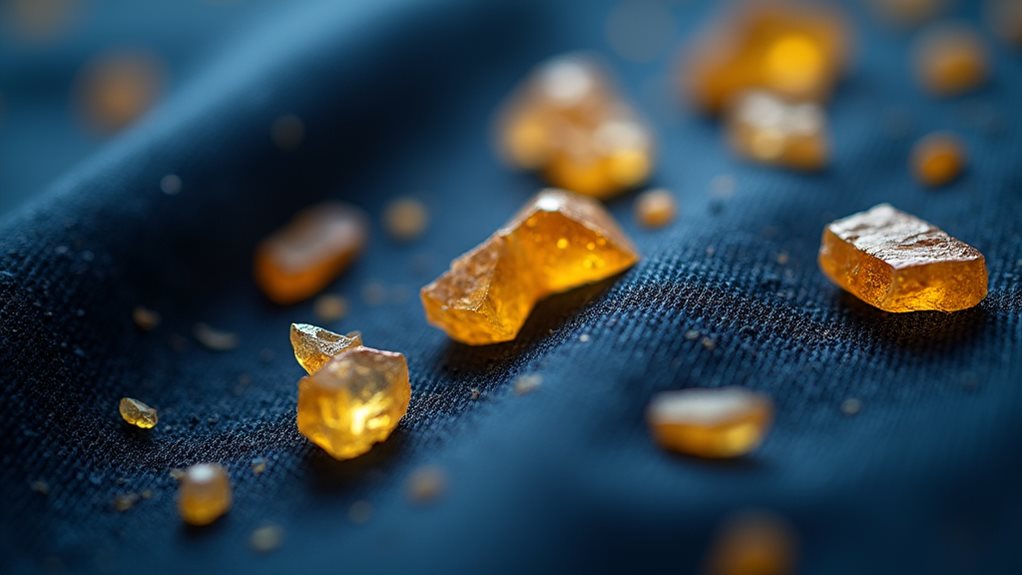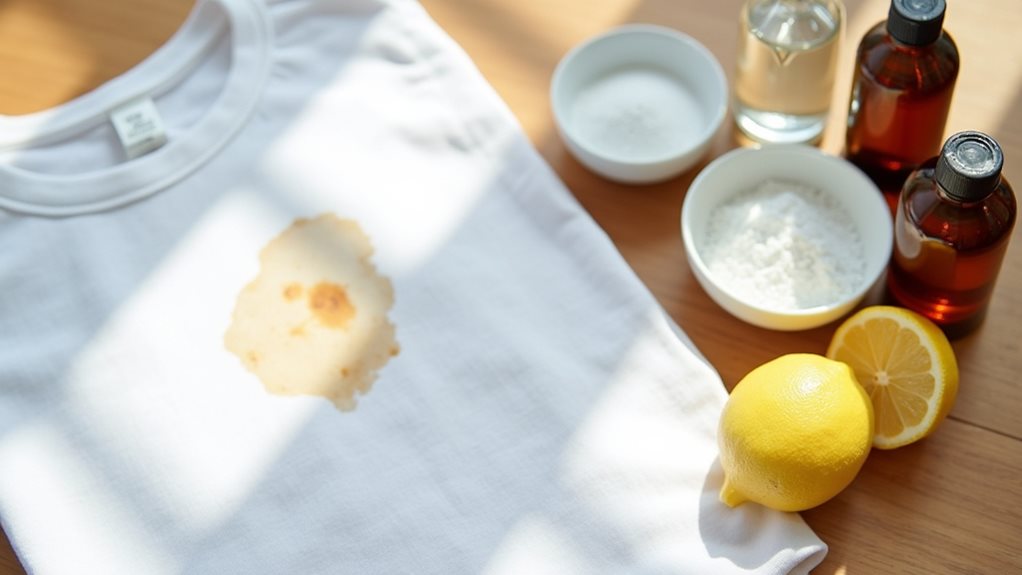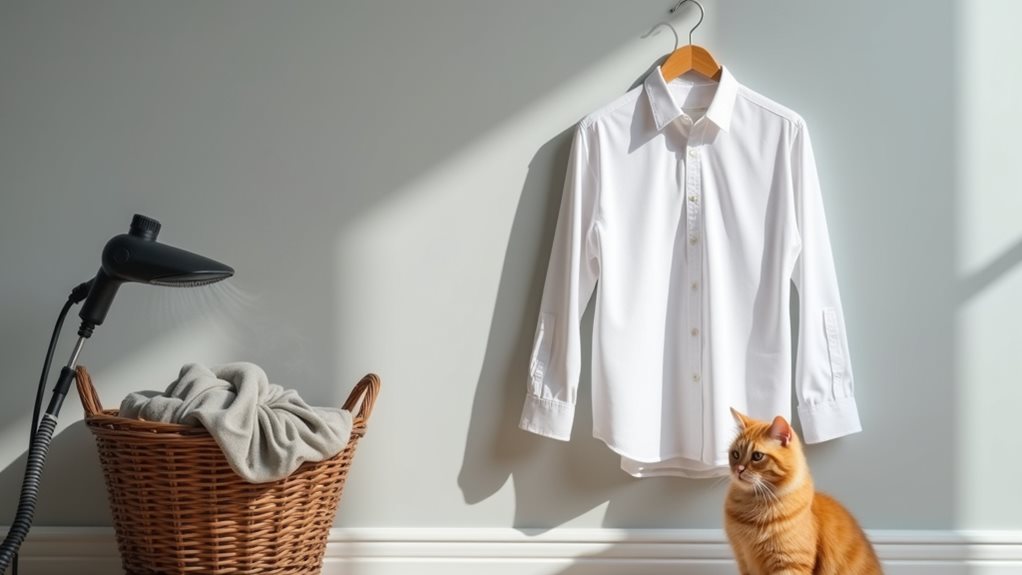Unfortunately, dry cleaning won’t rescue your favorite clothes from that stubborn cat pee smell, and I learned this the hard way after spending $30 at my local cleaner. Traditional solvents simply can’t break down the uric acid crystals that create that persistent ammonia odor, and the heat actually locks those smells deeper into fabric fibers. You’ll need enzyme-based cleaners that digest the proteins at their source, and there are several effective home remedies that’ll save you money and heartache.
Why Traditional Dry Cleaning Fails Against Cat Urine
When I first discovered my cat Whiskers had turned my favorite cashmere sweater into his personal bathroom, I naively thought a quick trip to the dry cleaner would solve everything – but boy, was I wrong.
I thought dry cleaning would magically fix my cat’s sweater disaster – turns out some problems need more than wishful thinking.
Traditional dry cleaning methods simply aren’t equipped to tackle cat urine because they can’t break down the stubborn proteins and uric acid that create those persistent odors.
The solvents used in conventional dry cleaning processes don’t target these specific compounds, leaving you with a clean-looking garment that still smells like a litter box.
Even worse, the heat involved in traditional methods can actually lock these odors deeper into fabric fibers, making future odor removal even more challenging.
The problem lies with uric acid crystals that bond so strongly to fabric fibers that standard dry cleaning solvents simply can’t break them down completely.
That’s why enzyme-based cleaners are becoming the gold standard for biological stains.
The Science Behind Uric Acid Crystals and Odor Persistence

Understanding why enzyme cleaners work so well requires looking at what makes cat pee so incredibly stubborn in the first place – and trust me, after dealing with multiple “accidents” over the years, I’ve become something of an unwilling expert on urine chemistry 😅.
Cat urine contains uric acid crystals that become your worst nightmare because they’re completely insoluble in water.
Here’s what makes these crystals so problematic:
- They remain embedded in fabric fibers long after liquid evaporates
- Heat and humidity reactivate the ammonia-like smell intensely
- Traditional dry cleaning solvents can’t break down their chemical structure
- The persistent smell gets worse over time without proper treatment
- Only enzyme-based cleaners can digest and eliminate these stubborn crystals
This explains why standard cleaning methods fail miserably, while targeted odor removal approaches succeed brilliantly. The urine also contains urea and bacteria that work together with the uric acid crystals to create persistent odors that bond deeply to fabric fibers.
Enzyme-Based Cleaners as the Superior Alternative

Since discovering enzyme-based cleaners during my second cat’s particularly rebellious phase, I can honestly say they’ve become my secret weapon against even the most stubborn urine odors that dry cleaning simply can’t touch.
Products like Nature’s Miracle actually digest the proteins in cat urine, breaking down those pesky uric acid crystals that cause persistent smells, while dry cleaning solvents just mask the problem.
Enzyme cleaners actually break down uric acid crystals at the source while dry cleaning only covers up the odor.
You’ll need to apply these cleaners multiple times for tough spots, but trust me, they’re worth the patience.
When you combine proper cleaning techniques like thorough blotting and soaking with quality enzyme-based cleaners, you’re targeting the root cause of odor removal instead of hoping dry cleaning will magically solve everything.
While dry cleaners excel at removing oil-based stains and grease from delicate fabrics, water-based stains like cat urine fall outside their wheelhouse, making enzyme treatments the clear winner for pet accidents.
Home Remedies and DIY Solutions That Actually Work

While enzyme cleaners are fantastic, there’s something deeply satisfying about whipping up your own odor-fighting concoctions from ingredients you probably already have lurking in your kitchen cabinets.
When my cat decided my favorite throw pillow was his new bathroom, I discovered these home remedies can actually compete with expensive enzyme-based cleaners.
Here’s what works when you need to remove urine from carpet or fabric:
- Soak affected areas in biological washing powder mixed with warm water, repeating until the smell disappears
- Spray diluted white vinegar directly on spots, reapplying as needed for stubborn odors
- Create overnight soaks using equal parts water and apple cider vinegar
- Target uric acid crystals with DIY enzyme solutions
- Maintain clean litter boxes to prevent future incidents
These solutions tackle cat urine smell effectively without breaking the bank! If you do opt for professional dry cleaning, make sure to air out the treated items thoroughly since PERC residues can remain on freshly cleaned garments.
Preventing Future Incidents and Protecting Your Fabrics

After spending countless hours scrubbing, soaking, and strategically placing enzyme cleaners around my apartment like some sort of odor-fighting battlefield commander, I learned the hard way that prevention beats cleanup every single time.
Now I religiously maintain my cat’s litter box daily, because a clean bathroom makes for happy cats who don’t seek alternative spots for their business.
I’ve also invested in pet-safe protective sprays for my favorite fabrics, creating invisible barriers that repel both odors and stains.
My suits now live in sealed garment bags, safely tucked away from curious paws and potential accidents.
Trust me, preventing future incidents saves you from emergency trips to the dry cleaner and protects your sanity—plus your favorite clothes won’t develop that persistent cat pee smell that haunts your wardrobe.
When you do need professional cleaning, consider choosing facilities that use safer alternatives like wet cleaning or liquid CO2 instead of traditional harsh solvents, which is better for both your health and the environment.




